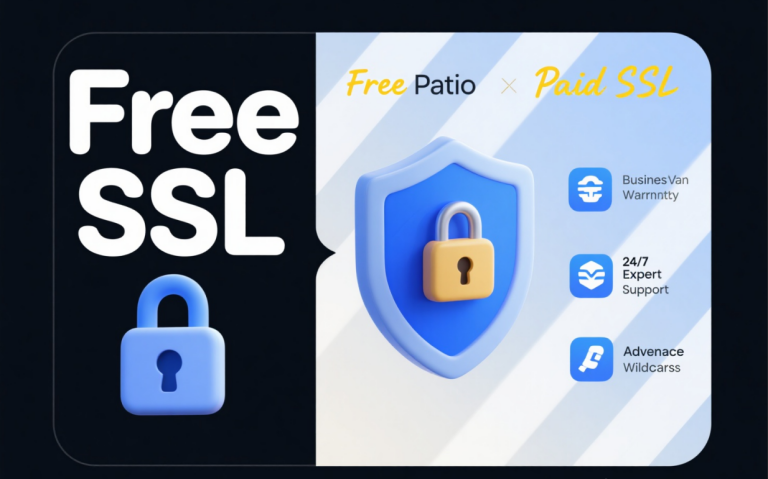
Let’s raise a virtual glass to Let’s Encrypt and the entire free SSL certificate revolution. They are the heroes of the modern web. They took a technology that was once a complex, expensive, and niche product and made it free, automated, and ubiquitous. They single-handedly transformed the internet from an insecure, plaintext wasteland into the encrypted, padlock-adorned landscape we know today.
For this, every website owner, every developer, and every user owes them a debt of gratitude. If you are running a personal blog, a hobby site, or a non-commercial project, a free SSL certificate is a fantastic, sufficient, and noble choice. End of story.
But this isn't a story about personal projects. This is a story about your business.
As your digital presence graduates from a passion project to a professional enterprise, you begin to grapple with more complex and higher-stakes questions. You realize that the small padlock icon in the browser, while absolutely essential, only answers one basic, technical question: “Is the connection between this user and my server encrypted?”
It doesn’t answer the more profound business questions:
“Can my customers trust who is on the other end of this encrypted connection?”
“What is my financial recourse if something goes wrong?”
“Who do I call at 3 AM when a critical certificate issue takes my revenue-generating site offline?”
“How can I efficiently manage security for my dozens of subdomains without losing my mind?”
This is where the conversation evolves. It moves beyond the simple, binary world of “encrypted vs. unencrypted” and into the nuanced, strategic world of risk management, brand identity, and operational efficiency. It's where we stop talking about a free utility and start talking about a smart business investment.
Chapter 1: The Baseline - What Your Free Certificate Does (and What It Doesn't)
To understand the value of an upgrade, we must first be brutally honest about what the free, baseline product provides.
The Analogy: The Standard Fire Alarm
A free SSL certificate is like a standard, battery-operated smoke detector. It is an incredible, life-saving invention. Every home and business should have one. It performs one critical function, and it performs it well: if it detects smoke (an insecure connection attempt), it makes a loud noise (the browser provides encryption and a padlock).
What Your Free Certificate Does Magnificently:
Provides Robust Encryption: Let’s be crystal clear. The level of encryption provided by a free Let’s Encrypt certificate is just as strong as the encryption provided by a $1,000 premium certificate. It uses the same industry-standard TLS protocols to create a secure tunnel, protecting data in transit from eavesdroppers.
Gets You the Padlock: It fulfills the basic technical requirement of all modern browsers, allowing you to display the coveted padlock icon and move your site to HTTPS.
Avoids Browser Warnings: It prevents browsers from plastering your site with a scary “Not Secure” warning, which is an absolute must-have for any website today.
For these reasons, a free certificate is infinitely better than no certificate at all. But its job description ends there. Here’s what it doesn’t do.
The Fine Print of "Free":
It Does Not Verify Your Business Identity: A standard free certificate is a Domain Validated (DV) certificate. As we’ve discussed before, the process to get one is entirely automated. The Certificate Authority (CA) programmatically verifies that you control the domain name, usually by checking a DNS record or a file on your server. It does not verify who you, the owner of that domain, actually are. A sophisticated phishing operation can get a free DV certificate for
paypal-securíty.comjust as easily as you can. The padlock on a DV certificate is not a symbol of business legitimacy.It Does Not Offer a Financial Warranty: If the CA were to make a mistake and incorrectly issue a certificate for your domain to a fraudster, and an end-user lost money because they trusted that fraudulent certificate, there is no financial recourse or insurance policy to cover those losses.
It Does Not Come with Human Support: When something goes wrong—and in the complex world of web infrastructure, things do go wrong—you are on your own. Your only recourse is to search through community forums and hope someone has encountered your specific problem before. There is no one to call.
It Has Functional Limitations: While getting a free DV certificate for a single domain is easy, managing more complex scenarios, like securing dozens of different subdomains with Wildcard certificates, can be more complicated or limited compared to the streamlined offerings from a commercial provider.
The free fire alarm is essential. But no one would suggest a major commercial bank should rely only on a battery-operated smoke detector for its entire enterprise risk management strategy.
Chapter 2: The Investment - The Four Pillars of a Paid SSL Certificate's Value
When you choose to upgrade to a paid, commercial SSL certificate, you are not paying for "better encryption." You are paying for a bundle of business-critical services that wrap around that core encryption. You are investing in four pillars of value that a free certificate simply cannot provide.
The Analogy: The Comprehensive Business Insurance Policy
A paid certificate is like a comprehensive business insurance policy from a reputable underwriter. It includes the fire alarm, of course, but its real value lies in the underwriting, the liability coverage, the emergency support, and the specialized options.
Pillar 1: Verifiable Identity (The Underwriting Process)
This is the most significant step up from a free DV certificate. Paid certificates offer Organization Validation (OV) and Extended Validation (EV).
What it is: This is a manual vetting process. The Certificate Authority (a globally trusted entity like Sectigo or DigiCert) has a team of humans who will investigate your business. They will check official government business registration databases, verify your physical address, and often call a verified phone number to confirm your organization is a real, legitimate, legal entity.
The Payoff (Trust): An OV or EV certificate transforms the padlock from a simple technical symbol into a powerful trust signal. A user can now click on the padlock, inspect the certificate, and see your verified company name right there. The conversation in the user's mind shifts from "Is my data safe from hackers?" to "Am I giving my data to a real, accountable company?" For any e-commerce, SaaS, or professional services website, this is a critical leap in credibility that can directly and positively impact user confidence and conversion rates.
Pillar 2: Financial Recourse (The Insurance Payout)
What it is: Commercial SSL certificates come with a substantial warranty, often ranging from $500,000 to over $1.5 million.
What it really means: This is not an insurance policy for your website. It’s an insurance policy on the CA's own validation process. It's a legally binding promise to the end-user. It says: "We, the Certificate Authority, are so confident in our rigorous background checks that if we ever make a mistake and issue a certificate to a fraudulent entity that impersonates the real business, we will compensate you, the end-user, for any financial losses you suffer as a result, up to this amount."
The Payoff (Confidence): While this warranty is rarely invoked, its existence is a powerful statement. It signals that the CA has significant financial skin in the game. They have a massive incentive to ensure their validation processes are world-class, which in turn gives you and your users a higher degree of confidence in the certificate's authenticity.
Pillar 3: Mission-Critical Support (The 24/7 Emergency Hotline)
What it is: Access to a team of dedicated security and certificate experts.
The Payoff (Peace of Mind): Imagine it’s the first day of your biggest annual sale. A server misconfiguration is causing an intermittent certificate chain error on some browsers. With a free certificate, you are in a panic, desperately Googling error codes. With a premium certificate from a provider like Cloudflew, you are on a priority support channel with an expert who has seen this exact problem a hundred times and can walk you through the fix in minutes. What is the ROI of saving your biggest sales day of the year? This support isn't a luxury; it's a mission-critical lifeline.
Pillar 4: Operational Flexibility (Specialized Coverage)
What it is: Access to specialized certificate types that solve complex business problems, primarily Wildcard and Multi-Domain (SAN) certificates.
The Payoff (Efficiency & Reduced Risk): As we’ve discussed, if your business has multiple subdomains (
blog.,shop.,api., etc.), managing dozens of individual free certificates is an operational nightmare and a recipe for a missed renewal. A paid Wildcard certificate allows you to secure an unlimited number of subdomains with a single certificate, managed from a single dashboard, with a single expiry date. This dramatically simplifies management, reduces labor costs, and lowers the risk of a costly outage due to human error.
Chapter 3: The Decision Framework - When Does the Investment Make Sense?
So, how do you decide when it’s time to graduate? Here’s a simple framework based on your business’s maturity.
The Free (DV) Certificate is a great choice if:
You are a personal blogger, a student, or a hobbyist.
Your website is a simple, non-commercial portfolio or brochure site.
Your site does not handle any user logins, payments, or sensitive personal information.
You are in the very early, pre-revenue, experimental stage of a startup.
It’s time to invest in a Paid (OV/Wildcard) Certificate when:
You start accepting money. The moment you ask a user for their credit card, you have a moral and commercial obligation to provide them with a higher level of identity assurance.
You start handling user accounts. If users are creating accounts and logging in, you are storing their data. An OV certificate shows you are a legitimate business that takes that responsibility seriously.
Your brand reputation becomes a critical asset. You are no longer just a website; you are a brand. Protecting that brand's reputation for professionalism and security is paramount.
You have more than 3-5 subdomains. The time your team saves and the risk you eliminate by switching to a Wildcard certificate will immediately provide a positive ROI.
You simply cannot afford downtime. Your website is mission-critical. The cost of a single hour of downtime is greater than the annual cost of the certificate and its expert support.
You should consider the premium investment of an EV Certificate when:
You operate in a high-trust, high-risk industry like banking, finance, insurance, or healthcare.
You are a major e-commerce brand where maximizing user trust at the final checkout step is a top priority for reducing cart abandonment.
You are a prime target for sophisticated phishing attacks, and you need the highest possible level of brand authentication to protect your users.
The transition from free to paid SSL is a natural and essential step in the lifecycle of any successful online business. It's a sign of maturity. It’s the moment you decide to stop just using a free fire alarm and instead invest in a comprehensive insurance policy, complete with underwriting, liability coverage, and an emergency response team. It’s not just a smarter technical choice; it’s the responsible business decision.

